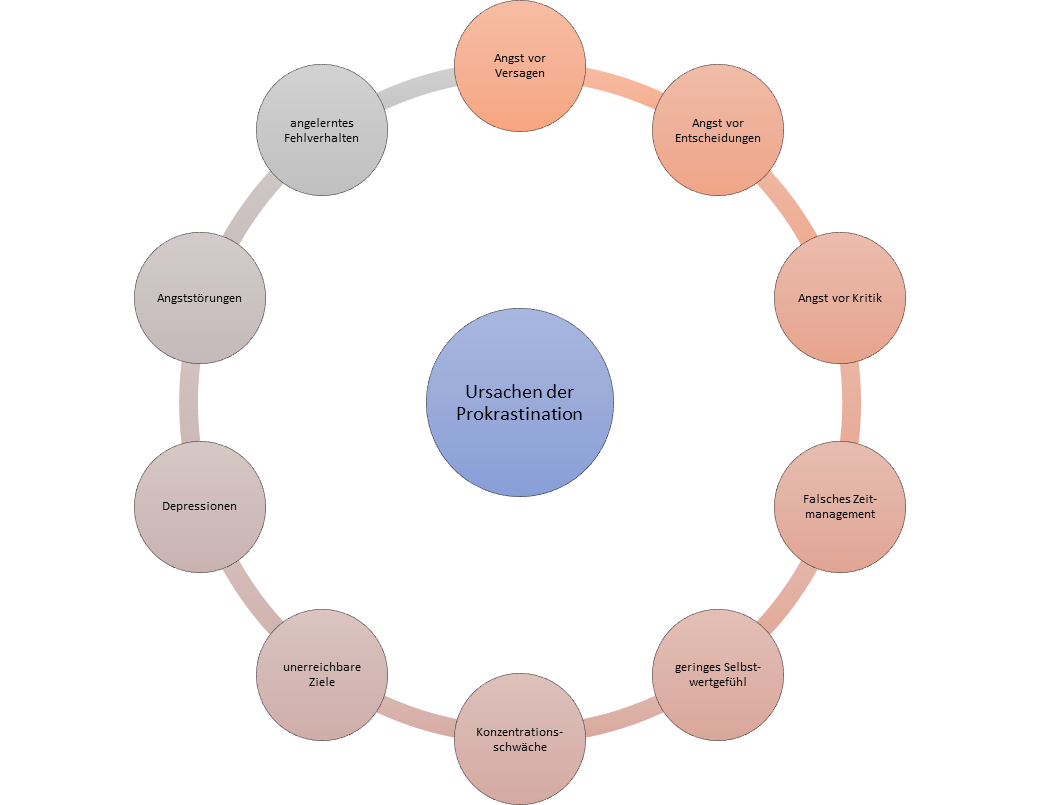Procrastination - I'll Do It Tomorrow!
Still procrastinating or already living? With these 10 tips, you'll stop postponing tasks!
Procrastination - I'll Do It Tomorrow!
Procrastination - I'll Do It Tomorrow!
The tax return is due, but instead, your kitchen cabinets are newly organized? Instead of going to the dreaded dentist appointment, you booked a blood test with your doctor? Cleaning the gutters has been on your to-do list for three weeks, but you went to the garden center and now have beautiful new flowers in your garden? Your boss told you last week to organize the filing cabinet, but instead, the communal kitchen is finally tidy again?
Meaning
Does this sound familiar? You postpone important but somehow unpleasant tasks and do other things instead? Then you're procrastinating.
Procrastina... what!?, you might think. Procrastination is the act of delaying important tasks and doing less important ones instead. We often call this "procrastination".
Procrastination shouldn't be confused with laziness. It's a chronic work disorder. This disorder can affect not only work and school but also everyday activities. Even setting your own goals doesn't help get the task done. In the worst case, it's either not done at all or completed under extreme pressure at the last minute.

Causes
The causes of procrastination are varied:
- Fear of failure
- Fear of decisions
- Fear of criticism
- Poor time management
- Low self-esteem
- Lack of concentration
- Unreachable goals
- Depression
- Anxiety disorders
- Learned "misbehavior"
About 20% of the world's population postpones tasks or appointments. If this happens occasionally, it's not a big deal, just human. But if it becomes a habit and affects our work and personal life, we should seek professional help.
Tips
As long as we haven't developed pathological procrastination, we can learn to break the routine of "procrastination" with small tips and tricks and turn it into productive habits.
1. Behavior Awareness
By understanding why we postpone tasks or appointments, we can work on changing our behavior positively. It can help to note when and why we delay tasks and what feelings this triggers.
2. Positive Thinking
Sitting in front of a task and thinking, "How will I ever manage this? It's so much!" lowers our motivation and increases the urge to postpone. A positive mindset can break this cycle. Positive thoughts boost motivation.
3. Set Priorities and Organize
We can set priorities by deciding what's important and urgent and what isn't. The Eisenhower method is very helpful. It helps you easily separate important from unimportant tasks. We'll explore the Eisenhower method in more detail in a future post.
Using to-do lists and mind maps, we can gather our tasks and organize our day.
4. The 5-Second Rule
Between having a thought and acting on it, no more than 5 seconds should pass. Otherwise, the risk of postponing the task increases. Before starting a task, count to 5 and then begin immediately.
5. Small Rewards
We love feeling happy. Combating procrastination requires consistency and self-discipline. Small rewards after completing a task increase our happiness and reinforce the feeling of doing the right thing.

6. Avoid Distractions
We're focused on a task, and suddenly the WhatsApp notification sound goes off. We automatically reach for the phone to check. This disrupts our concentration, and it takes time to get back into the task. If possible, we should avoid all distractions when completing a task. For example, we could put the phone on silent and place it face down on the table or in a drawer and check emails only twice a day at set times.
7. Set Breaks Properly
By taking 5-10 minute breaks between tasks, we allow our mind and body to rest and recharge. Scheduled breaks also help us work through tasks more focused.
8. Separate Leisure and Work
We should set times. A fixed time span for tasks, appointments, and duties. After that, it's leisure time. By strictly separating work and leisure, we look forward to relaxing after work. This motivates us to complete our tasks during the day, knowing we can enjoy our evening guilt-free.
9. Establish Routines
By establishing routines and sticking to them, we avoid the urge to postpone tasks. With a little discipline, routines can be quickly learned.
10. Set Smaller Goals
If a task seems too big, we should try breaking it into smaller sub-goals. Small goals boost confidence and motivation. The SMART formula helps define goals correctly.
Conclusion
We all know "procrastination" and have experienced it. As long as it stays within limits and doesn't negatively impact our lives, it's not dangerous. With our tips, you can proactively prevent procrastination.
However, if our job, social relationships, and daily life are severely threatened, professional therapy is essential.
